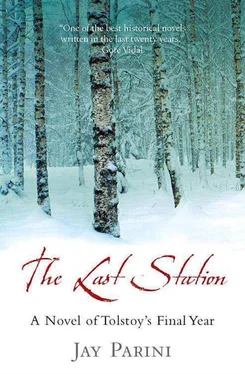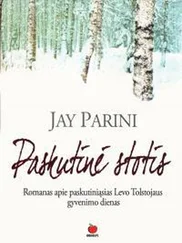3 July 1908
It is still agonizing. Life here at Yasnaya Polyana is completely poisoned. Wherever I turn, it is shame and suffering….
6 July 1908
Help me, O Lord! Again I long to go away, and I do not make up my mind to do so, yet I do not give up on the idea. The great point is: whether I would be doing it for my own sake if I went away. That I am not doing it for my own sake in staying, that much I know for certain….
9 July 1908
One thing grows more and more excruciating: the injustice of the senseless luxury in the midst of which I am living with undeserved poverty and want all around me. I feel worse and worse, more and more wretched. I cannot forget, I cannot help seeing what I see.
Doubtless it was God’s will that he should live. Shortly after, we went walking in Zasyeka Wood, he moving very slowly, as when he is lost in thought. It was oppressively hot that summer, the air sticking to the skin like beeswax. I said, ‘Dear friend, I sense that you are suffering.’
He turned to me with his face shining, his eyes glittering like crystals. ‘I’ve been thinking a great deal of late, thinking very deeply. And it has become clear to me that when one stands at the parting of ways and does not know which way to act, one ought surely to give preference to the decision which involves the most self-sacrifice.’
I understood by this remark that he had chosen to remain with Sofya Andreyevna. Surely nothing could be more painful than that. But I refrained from comment. I have tried, repeatedly, to remind myself that Leo Nikolayevich has devoted himself to Sofya Andreyevna for nearly five decades; he has borne her prattling, her violent temper, the indignities she heaps upon him daily. I thank God that Anna Konstantinovna has never wavered in her devotion to righteousness. She has labored beside me, never questioning the justice of my activity. She understands that a woman’s role is to encourage and sustain the intellectual and moral work undertaken by her husband.
As the troika took me through the foggy countryside to Kochety, I recalled a similar morning in 1883 when, fortuitously, I found myself on the same train from Moscow to Petersburg with Leo Nikolayevich. I had, indeed, heard of Leo Tolstoy and his writing before this meeting. Once I saw him across a crowded room in Moscow: his features remained vividly in my head – the ruddy bulb of his nose, the wispy beard, which had not yet turned white.
He was alone on the train, reading, and though I was assigned a different seat, I decided to risk offense and sit across from him. Having only lately read one of his books, I felt confident of my ability to engage him in conversation.
Seeing me, he put his book aside. Our eyes met sharply.
‘Count Tolstoy?’
He raised his eyebrows.
I mentioned the reception, which he seemed not to recall. ‘I am a great admirer of yours,’ I continued. ‘Though I take issue with some of the things you have written about the Cossacks.’ He romanticized them, I suggested. To my surprise, he quickly agreed. I have since learned that Leo Nikolayevich likes nothing better than serious readers who will take the trouble to contradict him.
We swiftly became friends, sharing many ideas and preoccupations, ideals, future plans. Had Sofya Andreyevna not made it difficult for us to continue our relations, there is no telling what we might have accomplished.
From a narrow, personal perspective, I have gained immensely from my contact with Leo Nikolayevich. I treasure the letters he has written to me over the years, especially the one dated 7 November 1884. ‘I would very much like to live with you,’ he wrote.
I wonder if you are perpetually as anxious as when we are together. You can’t be like that at home (though – if your letters suggest the truth – you are constantly pressed for time). As you know, I once wrote part of a novel about Peter I, and there was one good thing about what I said – my explanation of his character and evil deeds by the fact that he was simply too busy with building ships, working at a lathe, traveling, making proclamations, et cetera. It’s a truism that idleness is the handmaid of discontent with oneself and, in particular, with other people. I would wish, for you, more calm, more idleness. More good-natured, warm, kindly, and self-indulgent calm and idleness. I would like to live with you and, if we are still alive, I shall live with you. Never cease to love me as I love you.
The directness of the man, the willingness to speak his emotions, his thoughts, clearly and boldly, has never ceased to shock me. I have, indeed, loved him as dearly as one can love another man.
The matter of his will continues to torment us all. The great novels, his diaries, and correspondence remain in the hands of Sofya Andreyevna. Far from seeing that this work receive the widest dissemination among the people, she wants to ensure that it can be published only in the most expensive and, for her, most profitable editions. Alas, she has Leo Nikolayevich cornered, and he cannot see a way around her.
I, however, shall propose that he make me the executor of his work. I can produce it cheaply and distribute it to the muzhiks. This will be the grandest of gifts to the Russian people. Ad majorem Dei gloriam , as the Jesuits say.
I felt quite faint with anticipation as the troika wobbled along the muddy road to the front door of Kochety. We had barely come to a halt when Leo Nikolayevich rushed out to greet me, his face full of expectation and love. I was, as ever, overwhelmed by my dear friend’s affection, so childlike and unqualified as we embraced, his face wet with tears. Indeed, my driver was embarrassed, turning away from us.
Perhaps those years I spent in England are at fault, but I confess that open displays of emotion unsettle me. Though I tried to respond to Leo Nikolayevich in kind, I shrank from him instinctively.
We went immediately to my room to talk over various publishing projects. Leo Nikolayevich expressed his satisfaction with young Bulgakov, whom I have come to distrust. He has been sending the most idiotic, unhelpful reports from Yasnaya Polyana. He is vain enough to imagine that I should actually want to hear his running commentary on Tolstoyan texts.
Although I tried, delicately, to bring the conversation to the matter of his will, Leo Nikolayevich sensed the drift of my language and emphasized his commitment to Sofya Andreyevna.
‘I couldn’t do it,’ he said, his voice faltering.
I put my hand on his shoulder. ‘I will never ask you to do anything against your better judgment. You must trust me.’
‘I trust you entirely,’ he said, standing, putting his arms around me, kissing me on either cheek. ‘Always, my friend.’
I told him that I had recently bought a new house, near Moscow, in Meshcherskoye. It is a lovely, secluded little estate, purchased with an inheritance recently passed on from a distant uncle. I said that he must come very soon to see it, since I have assembled a group of Tolstoyans – young men mostly, from the university – who will live there with me and help me in the work at hand. To my astonishment, he accepted instantly.
‘I shall come soon. In a few weeks!’ he said. ‘Perhaps Sasha will come with us. She is doing so well, you know. Recovering in the Crimea. Her doctor has written a most encouraging letter.’
The poor, dear man. I held him close to me, and we kissed once more on either cheek. For a long moment, we encountered each other with the rarest intimacy. Then we heard the rustle of carriage wheels, dogs barking, and the shouts of many servants. Soon the shrill voice of Sofya Andreyevna rose above the clatter: defiant, self-righteous, commanding.
‘Sonya!’ said Leo Nikolayevich, sucking in his lower lip. ‘She has found us, I’m afraid. I half-expected her.’
Читать дальше












